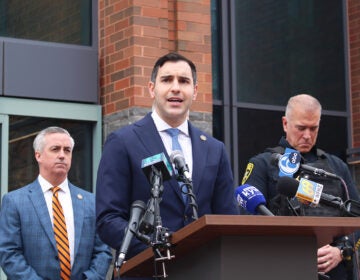Amid coronavirus threat, feds release two immigrant detainees in Pa.
Crowded conditions in immigration detention could spread coronavirus. The lack of social distancing is compounded by limited access to soap, according to an ACLU complaint.

In this file photo, Immigration and Customs Enforcement agents enter a restaurant to remove evidence. (David Duprey/AP Photo)
U.S. Customs and Immigration Enforcement is releasing two immigrant detainees with underlying medical conditions in Pennsylvania, following outcry that people would be in jeopardy if the coronavirus spreads inside these facilities.
Two men originally from Indonesia are slated to leave the Pike County Correctional Facility on Friday, according to their family members and attorneys who received notification from ICE.
Mansyur, 41, suffers from diabetes, thyroid issues and high blood pressure.
Agus Prajoga, 48, has diabetes, cholesterol, high blood pressure, and hepatitis B. Both are “at a high risk of severe illness or death” if they contract the coronavirus, according to a lawsuit filed Tuesday by the American Civil Liberties Union of Pennsylvania.
The lawsuit asked for the release of 13 immigrants currently held on immigration offenses in Pike, Clinton and York Counties, due to their age and health issues that make them more likely to become critically ill during the coronavirus pandemic.
Both Mansyur and Prajoga had lived in the Philadelphia region for more than two decades before being taken into ICE custody in the last six months. Their cases are on appeal and neither has any criminal convictions, according to attorney Christopher Casazza.
“They’re all people who’ve been in this country for a long time,” said Witold Walczak, legal director of the ACLU of Pennsylvania. “The government’s trying to send them back, [but] there’s no reason they shouldn’t be in the community while they’ve appealed.”
Crowded conditions in county jails could contribute to the spread of coronavirus, experts say. It also directly contradicts the current state guidance, which includes staying home and avoiding gatherings to slow the spread of the global pandemic, and is compounded by limited access to soap, according to the ACLU complaint.
Fears of the rapid and deadly spread of COVID-19 in detention facilities were given new weight this week when the first case of the disease was confirmed in an ICE detainee, a 31-year-old man from Mexico held in New Jersey.
Earlier this week, a federal judge in New Jersey ordered several people released from jails where COVID-19 had been confirmed. More than 3,000 medical professionals also signed a letter to Acting Director of ICE Matthew Albence, urging the release of ICE detainees after seeing the deadly sweep of COVID-19 through nursing homes and other closely confined spaces.
An ICE spokesperson shared that there is no policy as of yet for releasing detainees due to the coronavirus pandemic.
“ICE makes custody determinations every day on a case-by-case basis,” he wrote. “ICE officers weigh a variety of factors, including the person’s criminal record, immigration history, ties to the community, risk of flight, and whether he or she poses a potential threat to public safety.”
The agency has wide discretion to release individuals in its custody and does sometimes free detainees over medical concerns.
It is not clear why these men are being released, while the other named plaintiffs have not been.
Danielle Arizzi’s fiancee, Courtney Stubbs, is one of those plaintiffs, currently held in Pike County. He’s been in the United States since 1991. For the last 14 years, he checked in with U.S. immigration officials regularly. Then, last June, she said he was put into ICE detention.
Originally from Jamaica, Stubbs has had a kidney transplant and is on medication that keeps his body from rejecting the replaced organ. Those pills also suppress his immune system, putting him at higher risk for critical illness from coronavirus.
“It’s like a roller coaster,” Arizzi said. “One minute you think he’s coming home and everything is going to be fine, and another minute you hear something else.”
WHYY is your source for fact-based, in-depth journalism and information. As a nonprofit organization, we rely on financial support from readers like you. Please give today.




![CoronavirusPandemic_1024x512[1]](https://whyy.org/wp-content/uploads/2020/03/CoronavirusPandemic_1024x5121-300x150.jpg)


